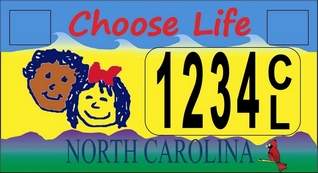 WASHINGTON — The U.S. Supreme Court has affirmed North Carolina’s right to issue “Choose Life” license plates, overturning two lower court rulings that declared the plates to be unconstitutional.
WASHINGTON — The U.S. Supreme Court has affirmed North Carolina’s right to issue “Choose Life” license plates, overturning two lower court rulings that declared the plates to be unconstitutional.
As previously reported, in February of last year, a three-judge panel with the 4th U.S. Circuit Court of Appeals unanimously upheld a federal judge’s ruling that struck down the plates as being “at odds with the First Amendment.” U.S. District Court Judge James Carroll Fox had opined in December 2012 that the plates amounted to viewpoint discrimination because the state did not also issue plates favoring abortion.
The state first began offering “Choose Life” plates in 2011 after legislators approved a measure allowing the pro-life plates to be produced. Each plate is an extra $25, fifteen of which goes to the Carolina Pregnancy Care Fellowship, a non-profit organization that helps to fund pregnancy care centers throughout North Carolina.
“The choose life license plate has already raised over 12 million dollars in the states that allow them, thereby helping mothers and their families,” director Bobbie Meyer told reporters. “Here in North Carolina, there are 85 pregnancy care centers who last year saw over 46,000 women and children.”
According to WGHP-TV in High Point, six separate amendments have been presented to lawmakers in the state legislature in an effort to have produced plates that read either “Trust Women. Respect Choice” or just “Respect Choice.” The legislature struck down all six amendments as they failed to obtain a majority vote.
The ACLU of North Carolina then filed suit on behalf of residents who thought it unfair that the legislature would not also allow the issuance of customized pro-abortion plates.
“This court concludes … that the states’s offering of a Choose Life license plate in the absence of a pro-choice plate constitutes viewpoint discrimination in violation of the First Amendment,” Fox declared.
“Issuing a ‘Choose Life’ specialty license plate while refusing to issue a pro-choice specialty plate constitutes blatant viewpoint discrimination squarely at odds with the First Amendment,” the Fourth Circuit then ruled months later. “Apparently, North Carolina wishes to celebrate only some interests of some of its citizens—namely, those with which it agrees. This it may not do.”
But on Monday, the U.S. Supreme Court overturned the ruling, ordering the Fourth Circuit to reconsider its decision in light of the high court’s ruling earlier this month in Walker v. Texas Division, Sons of Confederate Veterans. The Supreme Court had ruled in Walker that state-issued license plates amount to government speech, and therefore, the state can reject messages that it does not endorse.
“The First Amendment does not allow groups like the ACLU to suppress a state’s positive message just because the state does not also simultaneously approve a conflicting negative message,” Alliance Defending Freedom (ADF) Senior Counsel Steven Aden said in a statement following the ruling. “Citizens of North Carolina have the freedom to promote messages on their vehicles that their legislature has expressly adopted through license plate legislation.”
Become a Christian News Network Supporter...


